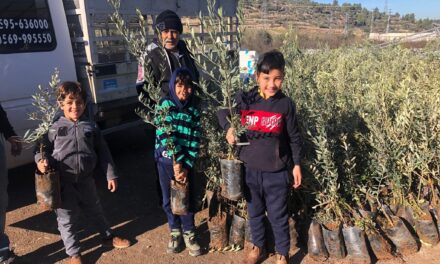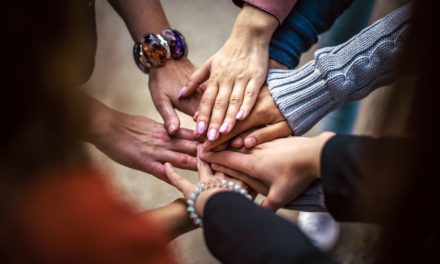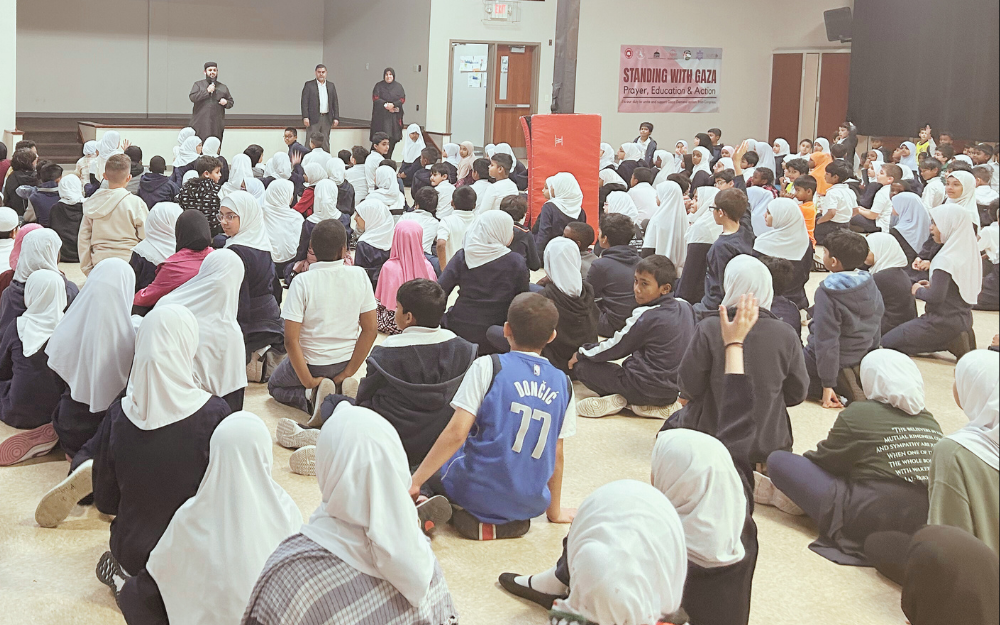
Islamic Society of Milwaukee Imam Rami Bleibel asked Salam Elementary School students Wednesday to pray for everyone suffering, regardless of race, religion or ethnicity.
“How many of you have seen the news about Gaza?” counselor and therapist Soheil Majeed asked students assembled at Salam Elementary School, 815 W. Layton Ave., Milwaukee.
About 450 students in grades 2 – 6 sat on the gym floor in 20 neat rows Wednesday facing Majeed, who was flanked by the Islamic Society of Milwaukee imam Rami Bleibel and Salam Elementary School Principal Khawla Asmar. ISM and Salam Elementary School collaborated to organize the assembly for the students who were probably impacted by televised images from the war in Gaza and “the conversations and emotional trauma their families are experiencing,” an ISM press release stated.
Practically every student raised their hand.
Israel began retaliatory airstrikes on Gaza after the Oct. 7 surprise attack by Hamas. Gaza is a densely populated area with about 2.2 million inhabitants. It also enforced a complete siege, shutting Gaza off from food, water, medical supplies and electricity. Palestinian Americans in Milwaukee reported the death of loved ones in Gaza and fears of losing more.
In Muslim households throughout Wisconsin, families watch televised images of scared, bloodied children and crumbled buildings where distraught family members try to dig their loved ones from the rubble.
“Parents seem to be spending a lot of time watching and talking about the news,” ISM director Othman Atta said. In multiple conversations with parents, teachers and members of the ISM community, “we discussed the need to comfort the kids.
“Kids are smart. When parents are talking, they will be aware. Some will be anxious. We wanted to talk with them about that anxiety, to let them know that it is normal and there are people they can talk to about it.”
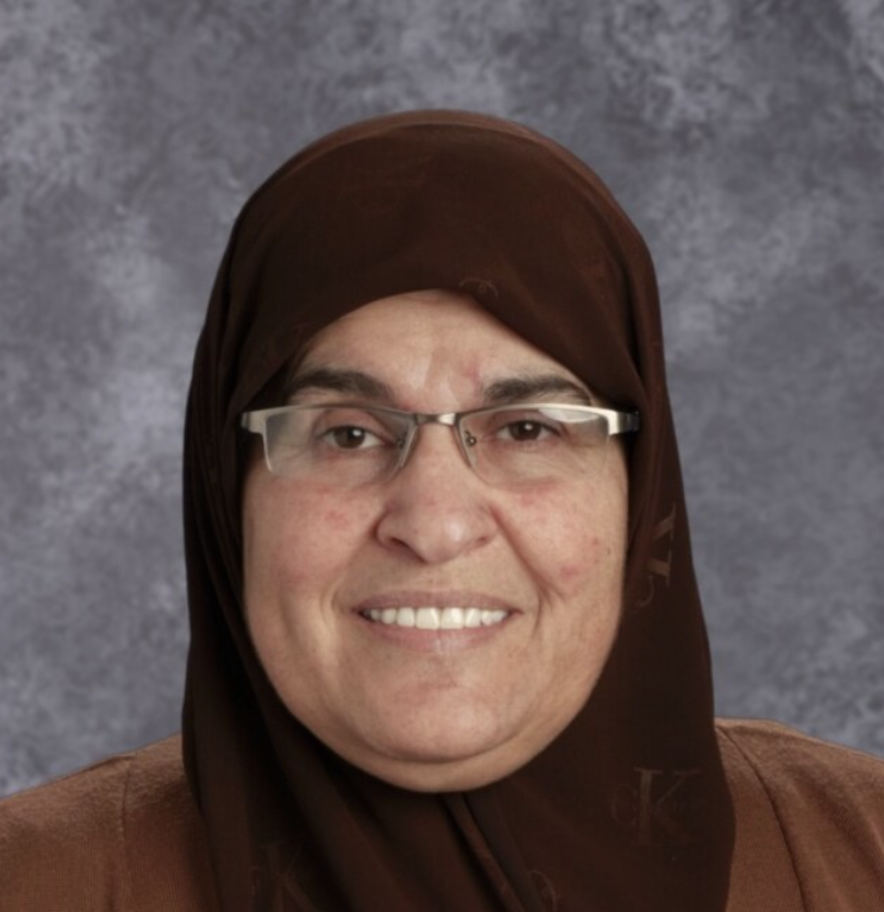
Khawla Asmar, Salam Elementary School Principal
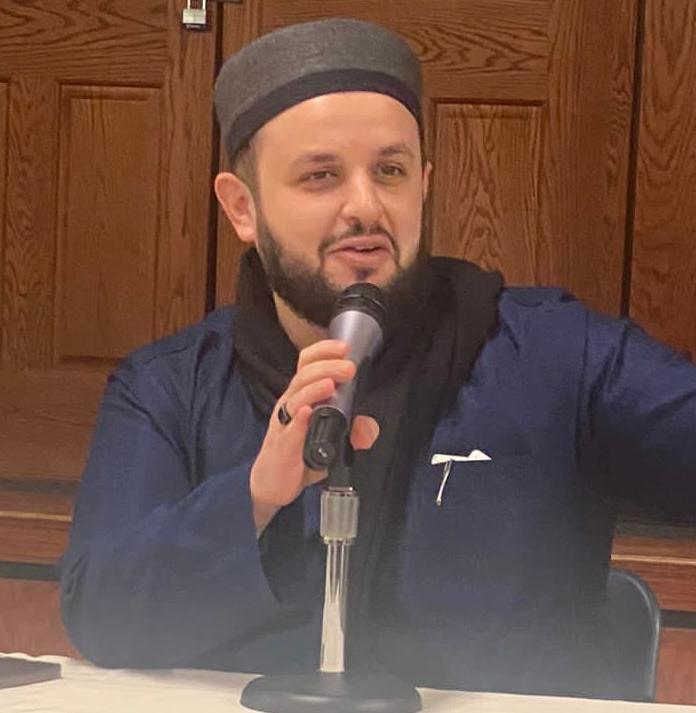
Shayk Rami Bleibel, imam at Islamic Society of Milwaukee
Salam Elementary School Principal Khawla Asmar told a Wisconsin Muslim Journal reporter that over the past week “we are definitely seeing some sadness, definitely some anger and confusion.
“War, occupation, killing—these are difficult things for children to process,” she said.
At the assembly, Majeed talked about fears students may have and how they can address them, and Shayk Rami Bleibel led the assembly in asking God’s help for all who are suffering, “especially the children of Gaza.
“It is our duty as Muslims to pray for everyone who is suffering and oppressed, no matter their race, religion or ethnicity,” he explained to the students.
In an interview with WMJ following the assembly, Majeed also shared advice for parents.
What can you do instead of watching the news?
Majeed, a marriage and family therapist and licensed professional counselor at the Muslim Community and Health Center of Wisconsin, advised students that rather than watch the news about Gaza, think about what they can do.
“Raise your hand if you want to help people in Gaza,” he said. Practically every hand went up again.
“Do you know how to make wudu (a purification ritual of washing before prayer)?” he asked.
“Yes,” multiple children answered.
“Do you know how to pray?”
“Yes.”
“Do you know how to make du’a (a prayer seeking God’s help for oneself or others)?”
“Yes.”
“Instead of watching TV to see what is going on in Gaza, pray and make du’a for them.
“Do you have money in a piggy bank? Ask your parents if there is a way for it to go to the people in Gaza to help them out.
“Tell your parents watching TV is not going to help the people who are suffering. Say, ‘Mom, Dad, instead of watching the news, let’s make wudu and pray.’”
Majeed encouraged any students who feel sad or upset about the news to talk to a teacher or go to Sr. Khawla, the principal. “She will talk to your parents and I can talk with your parents about what is bothering you.
Create peace at home
In his interview with WMJ, Majeed had one message for parents: “Create a peaceful atmosphere at home.”

Sohail M. Majeed, M.S., L.P.C., M.F.T.
Images on the news can traumatize adults and children, he said. The stress, anger and anxiety parents may demonstrate when watching the news “affects the whole family’s wellbeing. A mother or father agitated by the news relates that feeling to their children.
“To avoid this, try to maintain as calm a manner as possible,” he advised. And, more important, turn the TV off.
“We adults are watching the news and talking about what is happening in Gaza and other parts of the world, and our children are listening. Some become depressed,” he said.
Instead of watching the news, pray and do other things to help, he suggested. “Pray for civilians on both sides who are hurting. We need to be concerned about all human beings.
“Our job as parents is to give our children peace, love and happiness,” he said.

